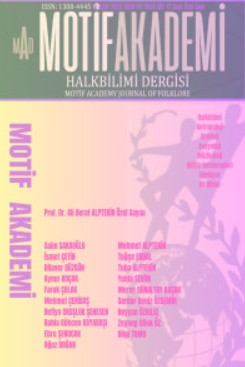GELENEKSEL EKOLOJİK BİLGİ BAĞLAMINDA IĞDIR’DA BİR HALK METEOROLOJİSİ UYGULAMASI
A FOLK METEOROLOGY PRACTICE IN THE CONTEXT OF TRADITIONAL ECOLOGICAL KNOWLEDGE
Author(s): Oğuz DOĞANSubject(s): Customs / Folklore, Human Ecology
Published by: Motif Halk Oyunları Eğitim ve Öğretim Vakfı
Keywords: TEK; Iğdır; Folk Meteorology; Culture; Hail;
Summary/Abstract: Traditional ecological knowledge, which is the result of humanity's effort to live in harmony with its environment on a common plane, forms the foundation of the cultural structure with a life understanding based on sustainability. The practices of weather forecasting and attempting to intervene in weather conditions, prevalent in Iğdır and its surroundings where agricultural activities dominate, are significant examples of this traditional knowledge. This study aims to compile folk meteorology practices, which fall within the scope of ecological knowledge sustained within the oral cultural tradition, through interviews conducted with local informants. The data consist of information obtained using qualitative research techniques. The research conducted in the region aims, in one aspect, to contribute to the documentation and preservation of traditional ecological knowledge. This study not only limits the traditional ecological knowledge in the region to the classification of nature and natural events but also strives to highlight its deep connection with folk culture. Thus, it seeks to fully reveal TEK and prevent possible cultural disintegration. These practices are evaluated within their context, considering the social structure due to the local nature of traditional ecological knowledge. The primary rationale for the locals to resort to such traditional ecological knowledge is to reduce the harmful effects of hail, prevent potential damage to agricultural plants, and contribute to the conservation of natural resources. As a result, traditional ecological knowledge-based practices, inherited from ancestors and continued by the local people, stand as an alternative that can be inspired to solve environmental problems arising in the region due to technological advancements and incorrect agricultural activities. In this regard, prioritizing and supporting TEK-based solutions in agricultural activities conducted in the region should also be considered a focal point for achieving sustainability goals.
Journal: Motif Akademi Halkbilimi Dergisi
- Issue Year: 17/2024
- Issue No: Sp. Issue
- Page Range: 132-145
- Page Count: 14
- Language: Turkish

